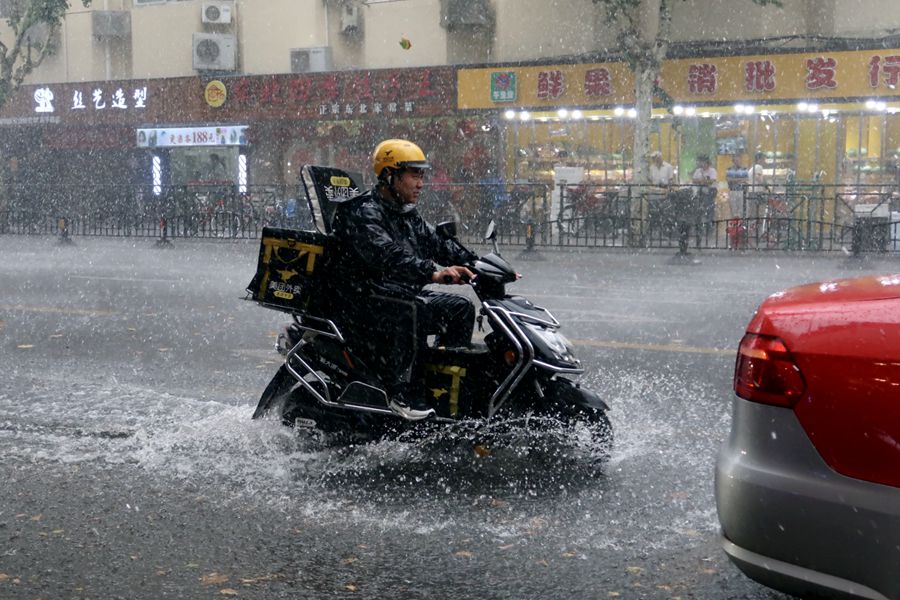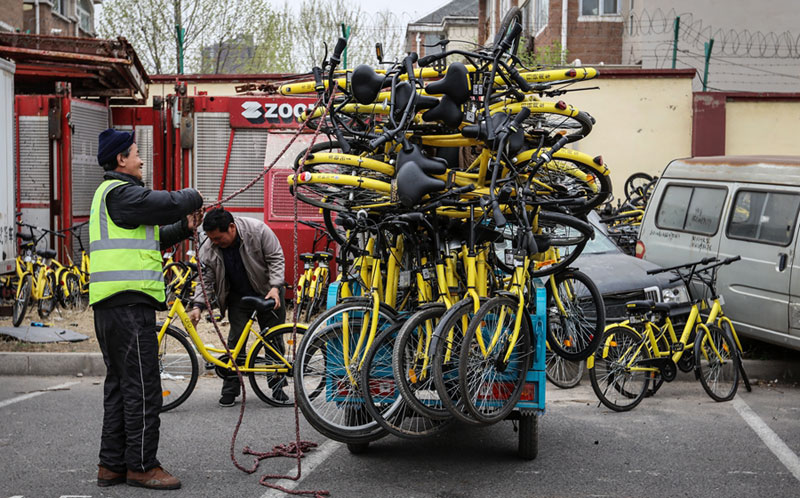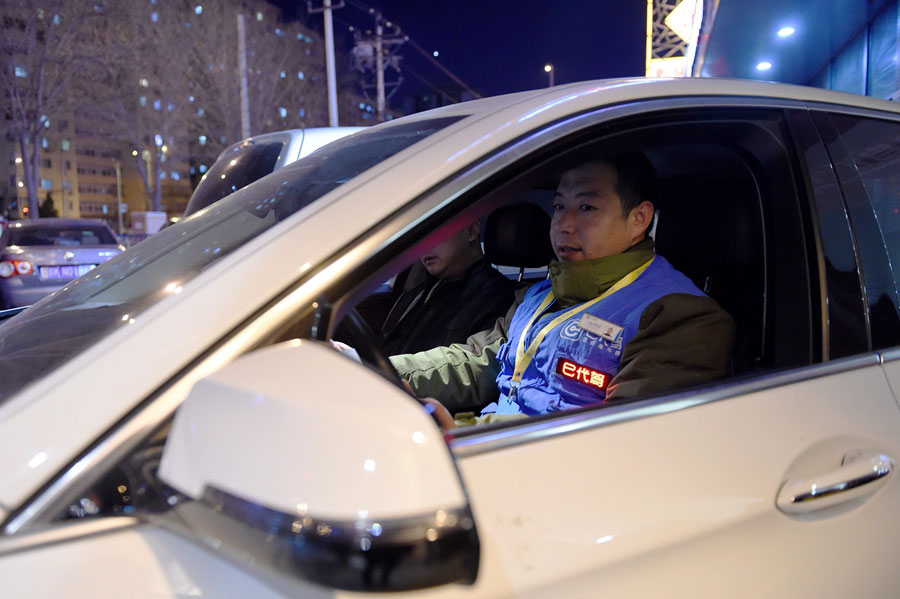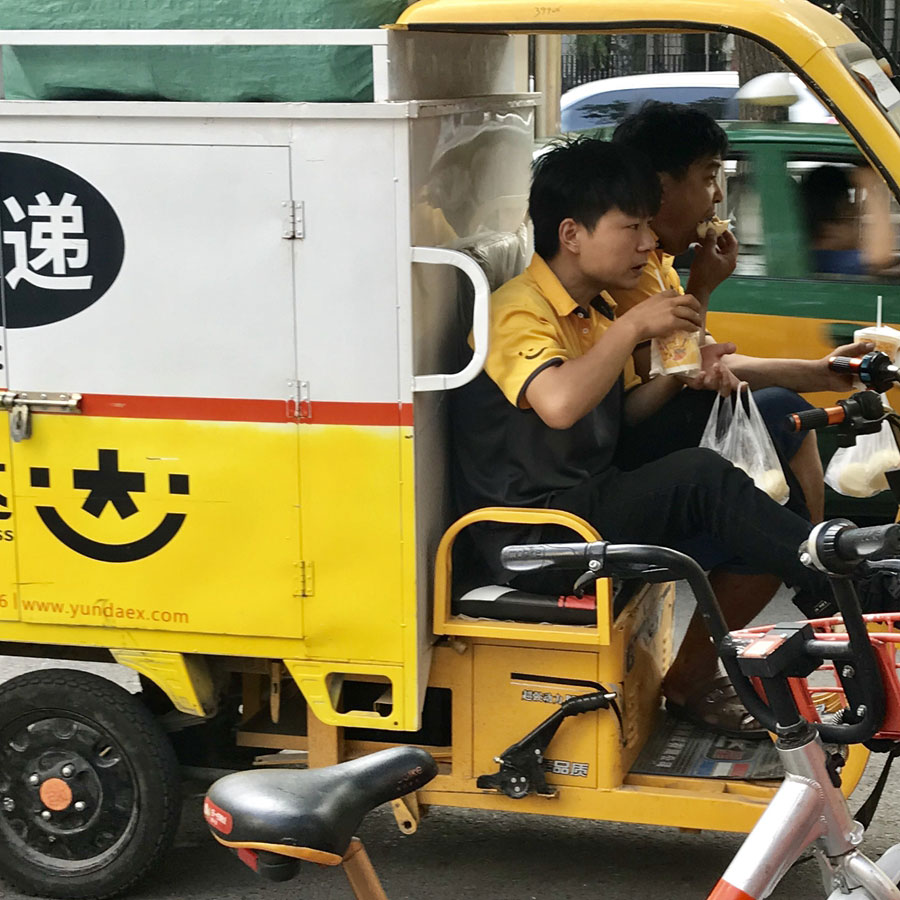


A food deliveryman rides through a rainstorm in Shanghai earlier this month, during peak season for the sharing economy. Many companies that operate via online apps do not offer employment contracts or insurance for workers in the event of sickness or injury. CHINA DAILY
A lack of job security and insurance coverage can spell disaster in the event of sickness or injury
The rapid development of China's sharing economy has seen a growing number of people opting to provide services on a casual basis for companies that operate via online apps, providing designated drivers, cleaners, couriers and food delivery to homes and offices.
About 70 million people were working in the sector last year, and the number is expected to hit 100 million in 2020, according to the State Information Center under the National Development and Reform Commission.
However, the casual nature of the arrangement means that many companies do not offer employment contracts or insurance in the event of sickness or injury, and there is no paid leave. Essentially, if an employee is unable to work, they receive nothing.
Wang Haoyu's story is a case in point. After his pelvis and legs were injured in a road accident in March, the 19-year-old deliveryman spent two weeks convalescing at his dormitory outside the north Fifth Ring Road in Beijing. From his sickbed, Wang watched as his comrades left early in the morning and returned late at night, and the realization that they were earning while he was not filled him with anxiety.
"They were all making money, but I wasn't. On the contrary, someone actually owed me money but wouldn't pay up, so I was quite worried," he said. That "someone" was the driver of a BMW who caused Wang's injuries when he turned unexpectedly, hitting the native of Kaifeng, Henan province, and severely damaging his electric bike.
At the time of the accident, Wang, who arrived in the capital in April, was working as a delivery rider for Baidu Waimai, an online food platform. The severe bruising he sustained left him unable to work, and as he had no medical insurance he had to pay 800 yuan ($123) for health checks and medication, and it cost 1,700 yuan to have his e-bike repaired.
The traffic police concluded that the driver was entirely responsible for the accident and was liable to pay compensation.
However, he flatly refused to pay, and though Wang had the option of suing for compensation, he decided against legal action because it would entail considerable time and energy. Instead, he repeatedly contacted the driver to request compensation, but was turned down every time.
"I only earn 200 to 300 yuan ($30 to $46) a day, but the accident cost me about 2,500 yuan," he said. "What's more, I earned nothing while I was recuperating. I was so depressed."
During his two-week layoff, he was desperate to start earning again. "I just wanted to recover as soon as possible to make money," he said.

An employee of Ofo prepares to move damaged bikes to a designated safe spot. CHINA DAILY
Insurance dilemma
Wang didn't know that his medical costs would have been covered if his employer had provided insurance against occupational injury. However, like many of the 70 million people employed in the sharing economy, he was not covered for occupational injury and had no access to a medical care program.
China's Labor Law and the Labor Contract Law stipulate that companies judged to have "labor relations" with employees are obliged to contribute the lion's share of payments toward five types of social security, including injury, medical and endowment insurance, while workers pay a minimal amount.
However, while the signing of an employment contract is often seen as signifying "labor relations", the law does not provide a standard definition. Meanwhile, few people who work for online platforms sign labor contracts, meaning they are not technically employed by the platforms, which are therefore not required to contribute to their social security payments.
E-Daijia, a leading designated driver platform, said its 200,000 drivers are classified as part-time employees. "They all have their own formal jobs, and are free to offer their services or rest any time they want. We sign service contracts with them directly and have no obligation to shoulder their social security requirements," said Zhang Dongpeng, a publicity officer for the company.
Platforms such as E-Daijia provide drivers for clients who are either unwilling or unable to drive their vehicles for various reasons, such as excessive alcohol consumption or the need to work en route. The designated drivers, who ride small e-bikes, accept orders via the company's mobile app, and when they rendezvous with the client they simply load their bike into the trunk of the car and drive to the specified destination.
Complex model
Other platforms, such as Ele.me, Baidu Waimai and Meituan Waimai-the country's three biggest online food delivery platforms-use a more complex employment model in which they cooperate with third-party companies that recruit casual workers via service contracts. The arrangement means neither the third party nor the online platform is obliged to contribute toward workers' social security payments.
"The model understands the needs of the delivery industry and benefits our operating efficiency," said Cai Min, a publicity official with Ele.me.
Liu Zhong works as a designated driver for Didi Daijia, a larger competitor of E-Daijia, in Beijing.
"I signed a service contract with a HR company in Zhejiang province, even though I work in Beijing. The contract I signed makes no mention of social security payments," said the 28-year-old native of Henan province. Calls requesting an interview with Didi Daijia were not returned.
Jiang Ying, director of the School of Law at China University of Labor Relations, said the model has a high degree of flexibility.
"Online platforms outsource their labor requirements to third-party companies. There's no fixed period of employment, so the platforms can decide whether to continue to use workers according to the prevailing business conditions," she said.
"Additionally, the model saves the online platforms money. Hiring workers directly requires high expenditure-for example, contributing to their social security payments.
"However, without the security provided by employment injury, medical and endowment insurance, the workers may experience financial troubles if they are involved in an accident, fall sick or just grow too old to do the job."

A designated driver employed by E-Daijia takes a client home during Spring Festival 2017. JU HUANZONG/XINHUA
Long hours, tough work
China is the world's biggest food delivery market. According to Meituan Waimai, Ele.me and Baidu Waimai, toward the end of last year, their combined 1 million riders delivered more than 27 million orders every day.
Though Xue Dongdong, a food delivery rider in Beijing, signed a service contract with Beijing Fengqiao Freight Co, a third-party outfit, he works for Baidu Waimai.
The 28-year-old from Shanxi province often works about 16 hours a day.
"I usually go to work at 6:30 am and arrive back at the dormitory at about 11 pm. If I don't do that, I won't fulfill my order quota," he said, adding that he has to make at least 400 deliveries a day just to collect his basic salary.
He noted that the food delivery industry has high and low seasons, according to the weather.
"The number of people who go out to eat falls during the hottest days of summer and the coldest days in winter-orders rise at those times. Right now, we don't have many orders because it's the low season, so I only earn about 4,000 yuan a month," he said, speaking in April ahead of the summer heat.
The riders accept orders via the company's app, and the amount they receive per order depends on the prices of the dishes requested and the distance they have to ride to deliver them.
Time is the big factor. Xue's contract stipulates that every order should be completed within 37 minutes-if not, he only receives half the agreed fee.
The situation means delivery operatives often ride too quickly and always keep an eye on their smartphones when in transit, searching for more orders, which places them at a greater risk of accidents.
"We all know it is dangerous, but customers place lots of orders at lunch and dinner times. If we don't accept them on the mobile app within a certain time, our salaries will be affected," he said.
The contract he signed with Beijing Fengqiao Freight clearly states that the company has no obligation to contribute to its riders' social security payments.
Initially, Xue wanted to find a job that provided social security, but his opinion changed when he realized he would have to make a contribution himself.
"I think it's more beneficial to save cash now. I don't really see any advantages to having social security at normal times," he said.
According to CNBC, Deliveroo, a leading global online food delivery platform, is providing free medical insurance for 35,000 food delivery riders in 12 countries.
The program covers as much as 75 percent of a rider's average income if they sustain an injury while working. However, the company declined to provide further benefits because it believes additional help could jeopardize the workers' self-employed status.

Two deliverymen eat breakfast aboard an express cart. XU JINGXING/CHINA DAILY
Disputes
The third-party model has also prompted labor disputes. Ofo, one of China's leading providers of shared bikes, used the model to employ people to locate damaged bikes and move them to designated locations.
However, according to news portal Jiemian, some workers staged a protest outside Ofo's Shanghai office in May, claiming they had been fired without warning after failing to meet what they believed were unreasonable targets. Ofo has denied the allegations.
Different attitudes
Given the rapid development of the sharing economy, some workers are happy to accept the lack of security as a necessary evil, while others have adopted a "once bitten, twice shy" approach.
"I believe that social security would be good for us, but it is not practical for my nominal employer (the HR company in Zhejiang) and Didi Daijia to pay my insurance," said Liu, the designated driver in Beijing.
"However, I don't intend to change my job because I am not skilled in any other work."
Wang Haoyu, the rider who was hit by a car in March, has conceded defeat in his attempts to obtain compensation from the driver. He has quit his job and returned to his hometown in Henan.
"I don't want to continue with the job because I felt helpless when dealing with the aftermath of the accident. If such a thing were to happen to me in the future, I would feel there was nothing I could do to claim the compensation due to me," he said.
"In future, I will only accept a job that provides social security payments, even if the salary isn't very good."

 Award-winning photos show poverty reduction achievements in NE China's Jilin province
Award-winning photos show poverty reduction achievements in NE China's Jilin province People dance to greet advent of New Year in Ameiqituo Town, Guizhou
People dance to greet advent of New Year in Ameiqituo Town, Guizhou Fire brigade in Shanghai holds group wedding
Fire brigade in Shanghai holds group wedding Tourists enjoy ice sculptures in Datan Town, north China
Tourists enjoy ice sculptures in Datan Town, north China Sunset scenery of Dayan Pagoda in Xi'an
Sunset scenery of Dayan Pagoda in Xi'an Tourists have fun at scenic spot in Nanlong Town, NW China
Tourists have fun at scenic spot in Nanlong Town, NW China Harbin attracts tourists by making best use of ice in winter
Harbin attracts tourists by making best use of ice in winter In pics: FIS Alpine Ski Women's World Cup Slalom
In pics: FIS Alpine Ski Women's World Cup Slalom Black-necked cranes rest at reservoir in Lhunzhub County, Lhasa
Black-necked cranes rest at reservoir in Lhunzhub County, Lhasa China's FAST telescope will be available to foreign scientists in April
China's FAST telescope will be available to foreign scientists in April